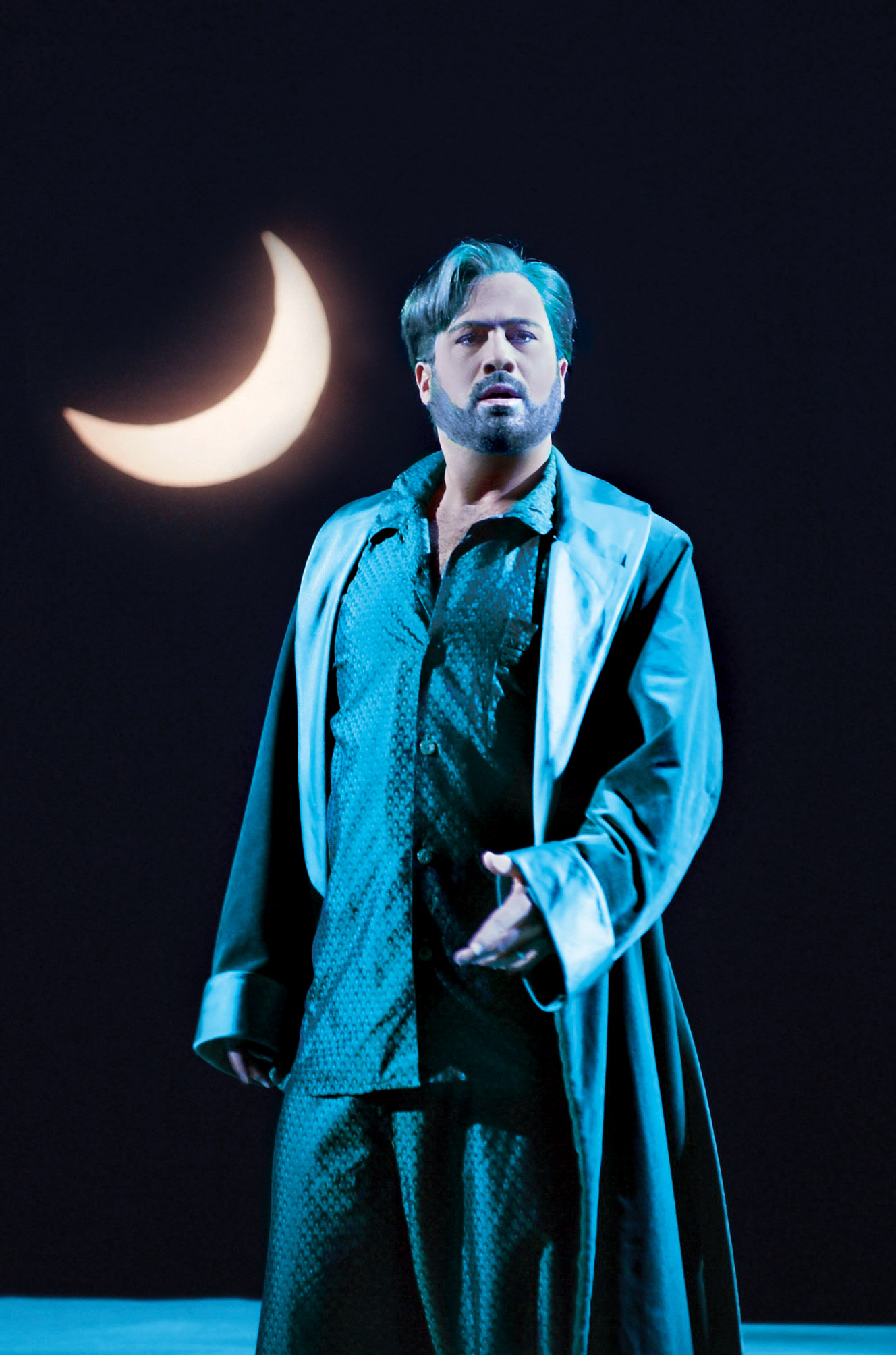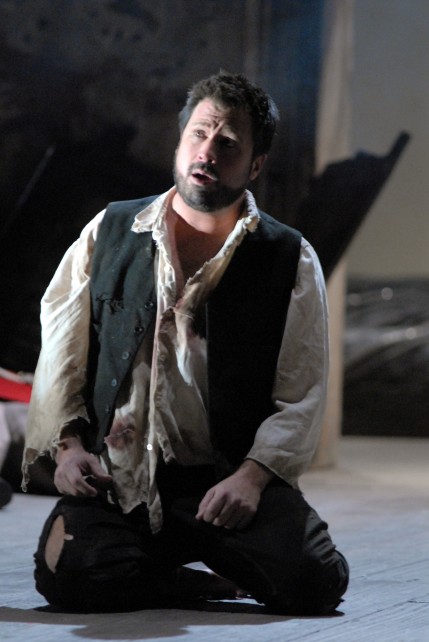David Daniels returns to Lyric Opera in Britten’s “Dream”

David Daniels has been a favorite of Lyric Opera of Chicago audiences since 2003 when he moped across the stage as the comically disconsolate Arsace in a sprightly production of Handel’s Partenope.
The American countertenor has been back regularly since then—in 2006 as a touching Orfeo in Gluck’s Orfeo ed Euridice and in 2007 as the sexy title character in Handel’s Julius Caesar.
This season the native of Spartanburg, South Carolina, will be on hand for not one but two Lyric productions. Beginning Friday, Daniels sings Oberon in a new production of Benjamin Britten’s A Midsummer Night’s Dream, the first time the company has presented this 1960 adaptation of Shakespeare’s comedy. He returns in March as Lichas in another Lyric premiere, a new production of Handel’s Hercules directed by Peter Sellars.
With his fashionably scraggly beard and a hint of Southern lilt in his conversation, Daniels wears his fame lightly as opera’s leading countertenor. Quick with a joke in a recent interview backstage at Lyric between rehearsals for Midsummer Night’s Dream, he talked about the challenges of singing 20th century as well as 18th century opera.
Daniels and Britten’s Oberon go way back.
“It was the first professional engagement I ever had,” he said. “It was 1992. I auditioned for the cover position at LA Opera. It was literally two weeks after my graduate recital at [University of] Michigan.” He didn’t perform the role in Los Angeles, but while in LA he received some valuable coaching and did an audition at the San Francisco Opera.
One of his teachers at the University of Michigan, British soprano Lorna Haywood, had urged him to study the role, one of the rare modern works written for countertenor.
“I always say that I know a bank is the countertenor’s National Anthem,” Daniels joked, referring to the tender but dark-hued Act I aria Oberon sings as he gazes as the sleeping Tytania.
In short order, Daniels was singing the role onstage, in 1993 at the University of Nebraska, then in 1995 in London with the English National Opera in an acclaimed production directed by Robert Carsen. Productions at the Metropolitan Opera, La Scala and Barcelona’s Teatre del Liceu followed.
Britten’s score is a potent combination of darkness and light. He created three distinctive sound worlds—eerily magical for the fairy kingdom of Oberon and Tytania; lyrical and romantic for the discombobulated lovers Hermia, Lysander, Demetrius and Helena; and more merrily straightforward for the “rustics,’’ a crew that includes Bottom, Quince and their cronies. (Britten’s send-up of bel canto opera in the rustics’ comic production of “Pyramus and Thisbe” could qualify as a fourth musical realm.)
“It’s scary low,’’ said Daniels of Oberon’s music, written to fit the vocal range of noted English countertenor Alfred Deller. But Daniels cherishes the role.
“I would never say no to a chance to sing it,” he said. “It’s such an ensemble piece.”
For most music lovers, A Midsummer Night’s Dream brings to mind Mendelssohn’s benign, fleet-footed sprites. But Britten, who used Shakespeare’s text for virtually the entire libretto, takes a more somber view. Angelic children may be singing in the opening scene, but their song is unsettled and dark. The forest surrounding the lovers casts dangerous shadows. Oberon is an angry, powerful figure, a fairy king fully capable of unleashing havoc.
“Possibly early on I saw Oberon as a little more magical,’’ said Daniels. “Now he’s a darker character.”

Stage director Neil Armfield, the mastermind behind Lyric’s riveting Sweeney Todd in 2002, and designer Dale Ferguson have conjured up a green, almost watery realm for Shakespeare’s revels. Imperious Oberon will direct much of the action from a golden basket suspended 17 feet above the stage. Daniels, who has sung Oberon in full, punked-out leather regalia, was unfazed by the prospect.
Rory Macdonald, a rising young Scottish conductor who is making his U. S. debut in this production, praised Daniels’ steady nerves. This is his first collaboration with the American countertenor.
“He knows the role inside out, backwards and every direction,” said Macdonald. “But he comes to it with a fresh, really keen understanding of the character and of Britten as well. He’s very flexible. A lot of the top singers I’ve worked with are interested in exploring every side of a character even if they’ve done it a lot before. It’s a myth that they just want to come and ‘park and bark,’ as they say.”
Outside of Oberon in Britten’s Midsummer Night’s Dream and Apollo in the composer’s Death in Venice, countertenor roles, which originated as showcases for the castrati of the 17th through early 19th century, are virtually nonexistent in modern-day opera. (Final details are still being settled, but Daniels is commissioning an opera based on an episode in Oscar Wilde’s life from Michigan-based composer Theodore Morrison.) Daniels returns to more traditional countertenor turf when he comes back to Lyric in Handel’s Hercules in the spring.
“What Handel does for my voice–and anybody’s voice–is that he knows how to write a melody,’’ said Daniels. “To me, he and Bellini are the two who were such masters at writing melody.”
Daniels isn’t sure exactly what Sellars, one of opera’s most inventive—and controversial—stage directors has in mind for Hercules. (Sellars’ previous Lyric productions include an updated Tannhauser in 1988-89 and John Adams’ Doctor Atomic in 2007-08.) The action will be set in the present, with Hercules (sung by American bass-baritone Eric Owens) a U.S. general returning from war to his stateside home.
“I haven’t worked with Peter since Theodora in 1996 at Glyndebourne,’’ said Daniels. “And now I’m doing two back-to-back because he’s doing the Vivaldi Griselda in Sante Fe in July.
“I love working with Peter. Theodora is still the top of my list as one of the most wonderful experiences, musically and dramatically. Everybody bought into it. It was modernized; it was space suits; it was Dawn Upshaw and myself being executed by lethal injection at the end. It was Peter, but it was real. I truly believe he’s real and his heart is right.”
Britten’s A Midsummer Night’s Dream opens Friday and runs through Nov. 23. Handel’s Hercules runs from March 4-21, 2011. lyricopera.org; 312-332-2244
Posted in Articles




